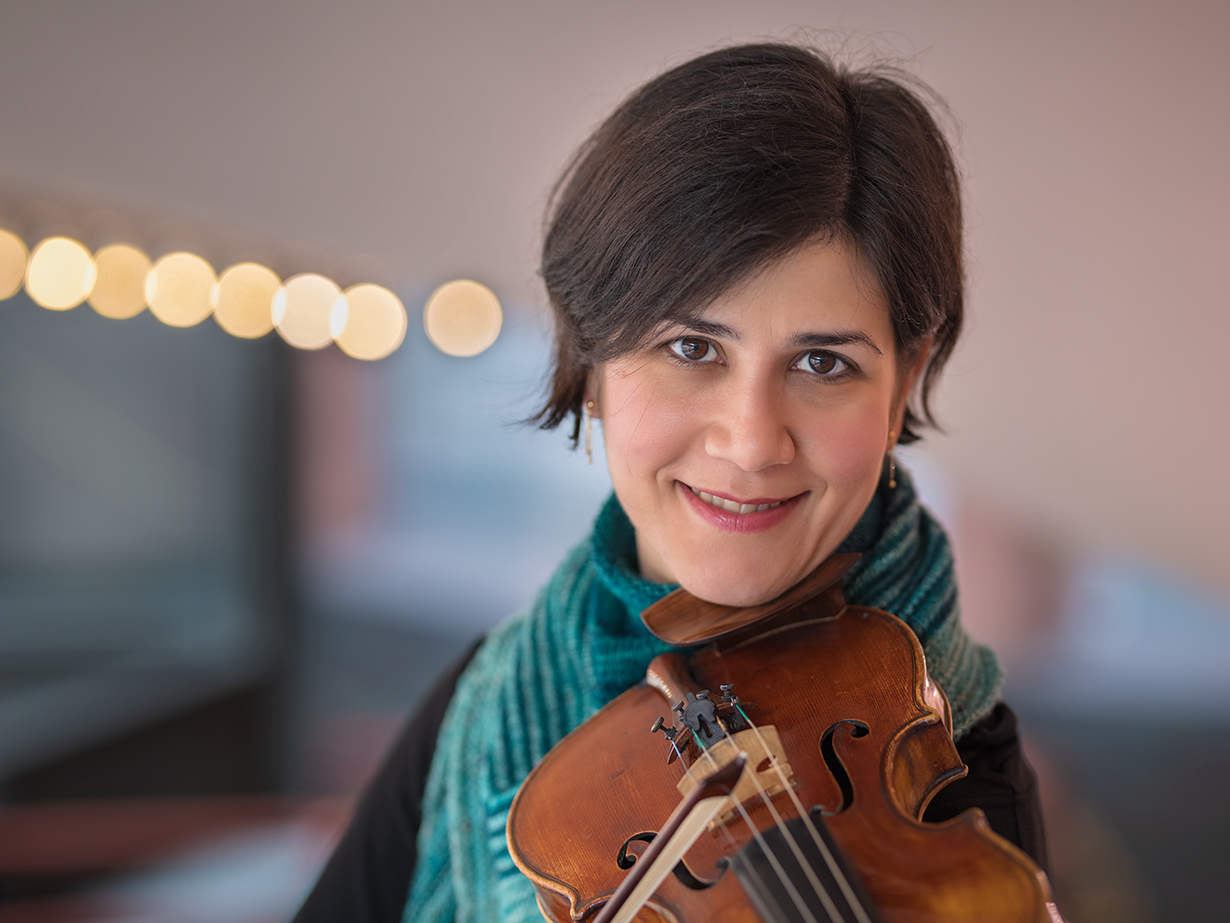It was her teachers, violinist Inés Voglar says, who gave her the courage to do what she loved the most and to trust that success would follow.
“Especially Roberto Valdés,” she says, describing her longtime teacher in Venezuela. “He wouldn’t let me go until I ‘got it’ and I loved it — even scales.”
Inés Ana Voglar Belgique was born in 1975 in Caracas, Venezuela. She grew up surrounded by cousins, aunts and uncles in her grandmother’s country house in the nearby town of Valencia. Her mother, a single mom, was an industrial engineer and worked in the city all week, joining the family on weekends.
Inés’ mother’s family immigrated to Venezuela from Slovenia in 1950, and the family still returns for visits.
Encouraged by her aunt, Inés started playing the violin at age 6. She trained under el sistéma, a government-funded music program started in 1975 in Venezuela, practicing for hours every day after school and sometimes making the three-hour bus trip into Caracas for private lessons.
But at the university, she enrolled in chemical engineering.
“I wasn’t sure I could make a successful career in music,” she explains. “So science was my backup plan.”
She also continued with music, studying with Valdés and playing in the local orchestra. Even then, though, there was unrest in the country, including teachers’ strikes, so that her university classes could be canceled — or the government might fail to pay her stipend for the orchestra work.
“It was discouraging and hard to make a plan for the future,” Inés’ says.
When Duquesne University in Pittsburgh announced auditions in Caracas, Valdés urged Inés to try out. She was one of just six Venezuelans to be chosen, winning a full scholarship.
“That was a turning point,” Inés says, “I finally decided to throw all my energy into music and give up my backup plan of chemical engineering.”
She finished her Bachelor of Arts degree in three years and then earned a Master of Arts from Carnegie Mellon University (also in Pittsburgh), where she studied with Andrés Cárdenas, “another inspiring and dedicated teacher,” according to Inés.
Throughout her student years, she was an active member of the local musical community, auditioning, winning several competitions, playing with the Pittsburgh Opera and subbing with the Pittsburgh Symphony Orchestra.
After she finished her M.A., her U.S. student visa expired, so she decided to try living in Europe to be closer to those Slovenian family roots. She did a European tour with the Pittsburgh Symphony, and then got a one-year contract with them so she could return to the U.S.
“I realized I was more of an American than a European,” she explains. “Now I have three passports — from Venezuela, Slovenia, and the U.S. — but here is where I want to live.”
In the spring of 2004, she auditioned with the Oregon Symphony, where she started as a section violinist. Later she won her current position as Assistant Principal Second Violin through another national audition.
Now she conducts the Young String Ensemble for the Portland Youth Philharmonic, teaches at Lewis & Clark College and has a few private students.
Because teachers have been key in her life, she sees teaching as the most important contribution she can make going forward.
“I see how the kids in music programs learn to work in teams, persevere and develop good work habits,” Inés says. “So I want to support music education and teach my kiddos to be good people and have fun playing music.”
Along with her husband, Joël Belgique, Principal Viola in the Oregon Symphony, she plays with Fear No Music, a nonprofit that promotes music education and mentors young composers. Their son, Alejandro, is 8 and already keenly interested in the piano and in music theory. Inés’ mother lives with them, providing the grandmothering that Inés herself enjoyed growing up.
Though anxious about the situation in Venezuela now, Inés says, “I can help best by being here.”
She also belongs to Venezuela’s Voice in Oregon, a group that sends assistance to contacts there.
Playing in the symphony combines her cultures, she points out.“My Venezuelan friends are such extroverts and I love them, but, with my European background, I’m not,” Inés says. “Music allows me to do the quiet, concentrated work I love while still being part of a wonderful, warm community.”
Reflecting on her life as a multicultural person, she says, “You have to be open-minded and figure out the way to embrace all the cultures around you.”


2 thoughts on “Embrace All Your Cultures”
Lovely! Very inspiring story.
Thanks for reading and glad you enjoyed it.
Nancy
Comments are closed.